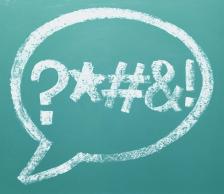Can I Use Profanity in a Speech or Podcast? (Part 2)
Swearing can be persuasive if you do it right. The Public Speaker explores how profanity can be used effectively when public speaking or in a podcast.
Lisa B. Marshall
Listen
Can I Use Profanity in a Speech or Podcast? (Part 2)
Imagine if you dropped a glass and broke it and you said “Oh, purse!” It sounds funny because the word purse doesn’t carry a negative meaning. Well, that’s not entirely true. My husband usually has a negative reaction when I say “Hey, do you like my new purse?” But that’s a different topic altogether..

Profanity is often a quick, unfiltered reaction to an emotional situation. But there are times when profanity can be used deliberately to add emphasis or persuade your audience.
In Part 1 of this series I gave you some reasons you should probably avoid profanity in your podcast or speech. But now I want to talk about when profanity might be used to actually enhance your message:
Tip #1: Swearing Can Be D**n Funny
Comedians are our best example of public speakers who use profanity well. Shortly before he died, comedian George Carlin was asked about the idea that a comedian who uses swearing as part of their performance isn’t funny enough without it. Here’s how he answered that criticism:
“There are also a few business speakers that fall into this category, [saying] ‘You don’t need to; you’re a funny man, you don’t need that stuff.’ Well, my argument is that you don’t need paprika or oregano or a few other things to make a stew, technically, either — but you make a better stew. If you’re inclined to make a stew of that type, ‘seasoning’ helps.”
Carlin pointed out that he could do an entire routine on TV with no profanity, but when it’s his option, he chooses to use it. “Why should I deprive myself of a small but important part of language that my fellow humans have developed?” says Carlin. “Why not use all of what we’ve developed to communicate with?”
Comedians who don’t normally swear sound strange when they do. Carlin mentions Bill Cosby as someone who has chosen not to use profanity. His audience would probably be uncomfortable if he suddenly let out a string of four-letter words during one of his routines.
Comedians and public speakers have a lot in common. If you’re a public speaker who’s known for using more colorful language, your audience probably wants to hear it and would be disappointed if you didn’t. But if it’s not part of your persona, using profanity won’t sound authentic.
Tip #2: Profanity Can Add Emotion and Emphasis

Have you ever listened to a podcast or watched a video by Gary Vaynerchuck? He’s a high energy co-founder and CEO of a social media marketing company. He’s also a public speaker, frequent guest on shows like CNN’s Piers Morgan, and a wine blogger. Gary’s from New Jersey and his enthusiasm is contagious. Just don’t listen to him with your kids in the room. I learned that lesson the hard way! Gary uses some very adult language to get his points across in his podcasts and videos. Like George Carlin, he can turn it on or off, depending on the situation. He’s got a huge following, and I believe his use of profanity is partly responsible for that.
When used smartly, profanity catches your audience by surprise. It says “This point is really important to me.” Some parts of your audience will connect with you better because of it (but some will tune you out for the same reason).
Tip #3: Profanity Can Be Persuasive
The persuasive power of mild profanity has been proven. In 2006, Scherer and Sagarin ran a small study where they divided up participants into 3 groups. They gave the same speech to each group except one used a mild swear word at the beginning, one at the end, and one not at all. The two audiences that heard the swear word were more persuaded then than the one that didn’t. The study also showed that using profanity in this way did not have a negative impact on the audience.
Profanity is more acceptable in some contexts than others. For example, an audience in the 18-25 age range is going to be more accepting of swearing than older audiences. It’s also worth noting that audiences feel differently about men and women swearing. Fair or not, we’re generally more accepting of a male speaker who uses profanity than a female.
The bottom line — choose your words carefully. Some use of profanity may actually help you connect with your audience better, but you also risk alienating some of your listeners. A few well-places swear words can be persuasive and passionate. But over-use of obscenities diminishes their power.
This is Lisa B. Marshall, Helping you maximize sales, manage perceptions, and enhance leadership through keynotes, workshops, books, and online courses. Passionate about communication; your success is my business.
What do all extraordinarily successful people have in common? Some traits are obvious – others are not what you might expect! Listen to inspirational interviews with New York Times bestselling authors, Pam Slim, Laura Vanderkam, Lois Frankel, and many more. Learn the principles, the mindsets, and the actions of successful people to amplify the exceptional person inside of you. Listen to Smart Talk: Inspiring Conversation with Exceptional People by visiting smarttalksuccess.com/blog or subscribe via iTunes at smarttalksuccess.com/itunes.
Resources
carlin on profanity and comedy

